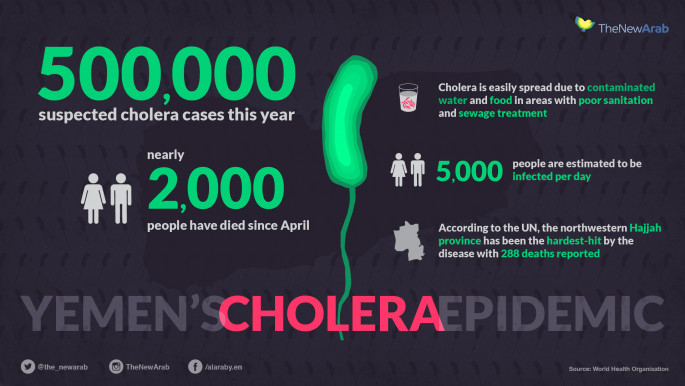'Breaking Point': Unpaid salaries hinder Yemen's fight against cholera
Tens of thousands of health workers in Yemen have not received their salaries in over a year, overwhelming the health system and impeding the battle to contain cholera in the war-torn country.
Since 2015, Yemen has seen a brutal war between the Saudi-backed internationally recognised government and Iran-backed Houthi rebels who took over the capital the previous September.
More than 10,000 civilians have been killed, with seven million Yemenis on the brink of famine.
Yemen's public infrastructure has all but collapsed following two years of war, with the health sector under particular strain amid an outbreak of cholera earlier this year.
Over 2,000 people have been killed by the treatable disease since April, with the Red Cross estimating that more than one million people could be infected by the end of 2017.
A new report by Medecins Sans Frontieres (MSF) highlights the urgency of the crisis affecting the health sector, where workers in the Ministry of Public Health and Population last received a salary in August 2016.
The group says that the non-payment of wages has brought the health system to "breaking point".
 |
|
 |
Over 2,000 people have been killed by the treatable disease since April |  |
"Tens of thousands of Ministry of Public Health and Population staff have not received their salaries in one year," Melissa McRae, MSF's Medical Coordinator in Yemen, told The New Arab.
"This has undeniably amplified the strain on the already struggling health system bringing medical services closer to the edge of collapse."
Thousands of health workers have been forced to secure incomes from elsewhere to ensure their families are able to survive, leaving hundreds of public facilities non-functional.
The remaining services available are overwhelmed with patients, compromising the quality of medical care provided, MSF says.
Medical centres which have managed to avoid closure often depend on charging or increasing the charge for treatments which were previously free, rendering them inaccessible to large swathes of the population.
"The massive ongoing cholera epidemic is a stark example of the consequences of the non-payment of salaries to medical staff", McRae said.
With few options left, thousands of public health workers rely on savings, relatives, friends or selling assets to survive.
"They kept saying 'tomorrow, tomorrow', but nothing changed. Since ten months ago nobody is getting salaries anymore, anyway", a nurse at the Al-Thawrah Hospital in Sanaa said.
"Most of us come here every day. If we don't, patients will die".
 |
Most of us come here every day. If we don't, patients will die - Nurse at the Al-Thawrah Hospital |
 |
Trauma of war
In addition to the scarcity of medicine and unpaid salaries health workers brave airstrikes and shelling while undertaking their work, leading to huge psychological stress.
Dozens of facilities and personnel have been attacked by airstrikes or shelling, while violence and threats against health workers are common, MSF says.
"The commitment we see every day from government staff is humbling", McRae told TNA.
"Working for a year without pay, many are doing whatever possible to keep health services running, however minimally, while wondering how to keep their families fed, clothed and safe."
For patients, the war affects their ability to access the health facilities which remain open, with most scared of crossing active frontlines in the conflict, checkpoints, or land-mined roads.
As a result, sick patients often die at home from treatable diseases, invisible to official statistics on death rates.
"Yemeni Authorities must immediately resume the payment of salaries to health staff", MSF said, calling on the international community to fulfil its promises to the country.
The UN has been exploring the possibility of provisional measures for six months while the World Health Organization (WHO) said they would pay incentives to health workers at cholera centres they assist, but have only partially followed through.
"This is too late and not enough," MSF said. "Ensuring health workers get sufficient remuneration is a life-saving intervention at this stage."







 Follow the Middle East's top stories in English at The New Arab on Google News
Follow the Middle East's top stories in English at The New Arab on Google News


